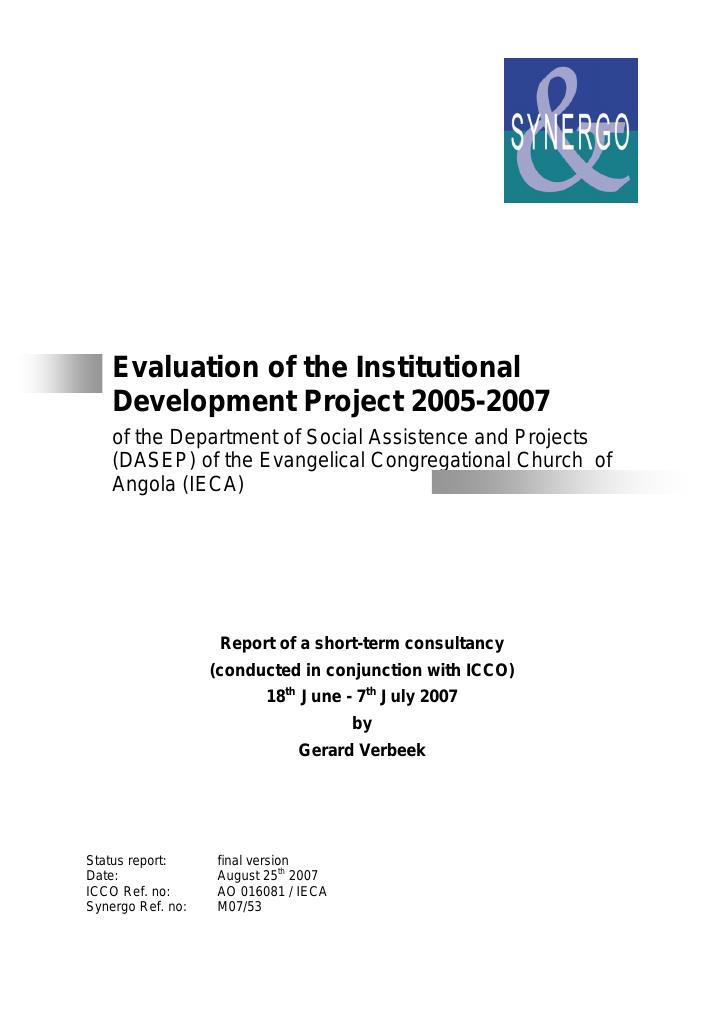Evaluering
Evaluation of the Institutional Development Project 2005 - 2007
Background: In September 2001, IECA introduced to ICCO the institutional project analysis which reached its highest point, with the workshop on the 5 years strategic plan 2003 - 2007. In December 2001, it was organized a meeting between the two organizations (IECA and ICCO), in Lubango, the capital city of Huila Province. This meeting, was a demonstration of common interests in strengthening the partnership between them in order to strength and improve IECA's intervention capacity in the communities. In 2003 ICCO started funding some planned actions to recover the institutional capacity of IECA. Purpose/ Objective: To contribute for the improvement of IECA's intervention in the communities, to promote sustainable development and to strength technical capacity within IECA's activists. To improve DASEP functioning at all levels of intervention Methodology: The methodology employed was hiring a consultant, which was Mr. Gerard Verbaek, the Synergo senior consultant. It included field visits to the communities in four provinces of Angola. A workshop was organized with DASEP national staff and church leadership. Interviews with key DASEP staff members and church leaders of IECA took place as well. The evaluation included also some meetings with representatives of a number of DASEP international partners like: Tear-Fund UK, NCA, DW, Christian Aid and Brot fur die Welt. Key Findings: • DASEP is helping communities to develop social and economic areas and to strength them how to participate more for their own development. That means, the communities should take decision about their own development, from the conception, elaboration, implementation, monitoring and evaluation in order to reach sustainable development.• IECA has established three main partnerships, which are: With the Government, with the community and with the civil society organizations. With the Government, IECA shall participate in education, health and civic and moral actions for citizenship education, peace consolidation and reconciliation. With communities, IECA shall promote actions for improvement and development of social conditions of the communities. With the civil society organizations, IECA shall establish partnership in implementing social actions in the communities. IECA shall also know the reality of the communities when implementing projects. DASEP has shown during the evaluation that the secret of a successfully implementation is the follow-up and monitoring during the projects implementation. Recommendations: DASEP is going through an important and enriching transition that is strong and promising, but certainly not completed yet. Changes must be firmly rooted, consolidated and carried forward. The issue of self-sustainability has to be worked on with priority. The present leadership should have the possibilities to work on these issues. Maintaining and fostering good relationship with church leadership in the province is crucial for the strengthening of DASEP in the provinces. Church leaders should continue to be involved in capacity building activities. Project agreements should be signed by provincial secretaries by: acknowledging, we agree upon, we know the rules and take the responsibilities.To enrich and enlarge the know how about participatory needs assessments by involving experts and practitioners and representatives of the communities. Comments from Norwegian Church Aid (if any): IECA has been one of our core-partners working with NCA in implementing areas of Gender, Water and Sanitation and Good Governance (PROJUME). The partner is seeking to get a high quality of its work and we believe that if IECA is able to follow the recommendations coming from this evaluation, the standard of its work will improve a lot. There is a good will and DASEP is making efforts in order to capacitate its technicians either those working in the planning or others working in the field.
